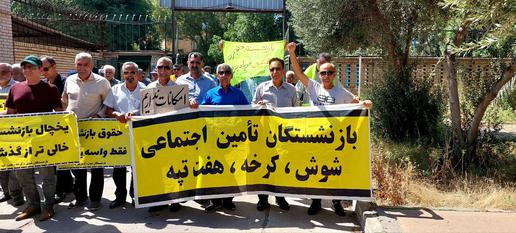Pressure on the family members of those killed during the Woman, Life, Freedom protests in Iran has escalated, with a new phase involving the prevention of their employment.
A mother of one of the victims told IranWire that many families are facing severe financial hardships and urgently need assistance.
She highlighted that the security forces' pressure on the families, particularly the petitioning mothers, is intensifying daily.
IranWire has spoken with several family members, including mothers, wives, and close relatives, who have requested anonymity to protect their safety.
According to these sources, the security forces are actively seeking excuses to imprison each of them.
They are not permitted to speak to the media, and efforts are being made to ensure they have no income, either by getting them fired from their jobs or by preventing them from being hired.
Narratives shared on social media by some of these individuals and other affected families corroborate these accounts.
They describe being dismissed from their workplaces or being unable to secure employment solely due to their association with the victims' families.
This systemic suppression aims to silence dissent and further isolate the families from economic stability and public support.
Kamelia Sajjadian, the mother of Mohammad Hassan Turkman, one of the victims of the crackdown on nationwide protests in Iran, used International Mother's Day to highlight the financial struggles faced by the mothers of other victims.
In an Instagram post, she mentioned the dire financial need of one of these mothers and called for donations, offering to facilitate and monitor the contributions herself.
Sajjadian has been a vocal advocate for these mothers despite facing numerous threats.
Her son, Mohammad Hassan Turkman, was a protester in Iran's 2022 Uprising, killed by security forces at the age of 26 in Babol.
Similarly, Fatemeh Heydari, sister of the deceased protester Javad Heydari, recently shared a poignant story on Instagram about Zahra Saeedianjo, sister of Milad Saeedianjo, another victim.
Zahra was denied employment only because of her family’s association with the protests.
Despite completing all job application steps successfully, the employer ultimately rejected her, citing the potential risk of repercussions from the authorities.
Zahra's video, where she tearfully expresses her frustration about her situation, has resonated deeply.
She articulated the pain of being unable to find work despite her qualifications, juxtaposed with the bravery of those like her brother who protested and paid the ultimate price.
This reflects a broader pattern where families of victims face systematic exclusion and pressure.
Leila Mahdavi, mother of Siavash Mahmoudi, echoed Zahra’s sentiments, recounting similar experiences of being told that hiring her would bring trouble due to her son's death in the protests.
Mahdavi condemned the injustice of being treated as dangerous simply because their children were killed while advocating for their rights.
Omid Saeedianjo, Zahra's brother, expressed his dismay at the lack of public willingness to bear any costs for the sake of victory and freedom, lamenting the youth’s sacrifices for an unappreciative populace. 26-year-old Milad was fatally shot by security agents during the protests in Izeh in November 2022.
The situation for these families remains precarious. Omid reported that Zahra was arrested at her workplace in Tehran last year, and taken to Evin Prison.
This was not her first arrest; both Omid and Zahra were previously detained by government forces during a birthday gathering at Milad's tomb in Izeh but were later released.
These stories underscore the continued repression and marginalization faced by the families of protest victims in Iran, who not only mourn their losses but also endure ongoing harassment and economic hardship.
Farzaneh Barzekar, the mother of Irfan Rezaei, wrote: "Our children die once, these cowards die and come back many times a day. Be sure, if they had a bit of understanding and intelligence, fear would have no meaning for them."
Irfan was killed in the 2022 protests in Amol, shot twice at close range by security forces.
Fatemeh Heydari's stories further reveal the shared pain among these families.
One family member stated, "We are the only ones who understand each other's pain."
Another shared their personal experience: "This is exactly what happened to me, Fatemah Jan. I went to work, they accepted me and told me that you are from the family of the killed, don't call me anymore. It's like we have AIDS, something."
Another echoed similar sentiments: "This is me, how familiar these words are."
Zahra Saeedianjo, to support herself, has begun selling her handmade products on Instagram through a virtual store named Kari.
In the page's introduction, she writes, "Once I had a syringe, angioket, and a blood pressure gauge, now I have a crochet hook... I am knitting here."
This shift from her medical background to crafting highlights the dramatic change in her life circumstances following the loss of her brother Milad Saeedianjo.
Many other families of the victims are similarly using social media platforms to sell handmade goods and generate income amidst ongoing economic and social pressures.
For example, one operates a virtual shop called "Qasedak," where they sell rings, earrings, bracelets, and necklaces.
Another, Niloufar Davoudi, offers women’s and girls' clothing through her "Nili Collection."
Niloufar is the wife of Alireza Khoshkar Bayani, who was fatally shot by security agents during a protest in December 2022, in Tehran.
Alireza was struck by a bullet at close range, which passed through his right hand, lung, and heart.
Instead of being taken to a hospital, he was transported to a police station, where he died from his injuries after hours of bleeding.
The families of those killed in the Woman, Life, Freedom protests continue to face severe economic and social discrimination.
First-degree relatives report that even ordinary citizens are fearful of hiring or employing them, citing concerns that it could lead to financial repercussions or trouble with authorities.
Fatemeh Heydari, sister of Javad Heydari announced last year that her brother Ruhollah had been fired from his job.
Fatemeh, along with her brother Mohammad and his wife Farank, had previously been dismissed from their workplaces.
Fatemeh shared on social media that Ruhollah was told, "You should acquit Javad your family to acquit me," reflecting the pervasive fear among employers of associating with the families of protest victims.
Additionally, Faeze Rahnavard, sister of Majidreza Rahnavard, an executed protester, was expelled from university.
These cases illustrate the broad impact on families, not just from government institutions but also from ordinary citizens who fear repercussions.
Mahmonir Molaei-rad, mother of 9-year-old Kian Pirfalak, who was shot by security forces in Izeh, was suspended from her teaching position, and barred from entering her workplace.
Her husband, Meysam, continues to receive medical treatment nearly two years after the protests.
This pattern of repression is not new. For over 40 years, the Islamic Republic has used threats, firings, arrests, and imprisonment to exert pressure on the families of protesters and political activists.
Family members, including parents, siblings, and even some second-degree relatives of those killed or executed, have been repeatedly dismissed from their jobs or educational institutions.
These measures aim to silence dissent by economically and socially isolating the families of those who dare to challenge the Islamic Republic, perpetuating a cycle of fear and repression.




























comments